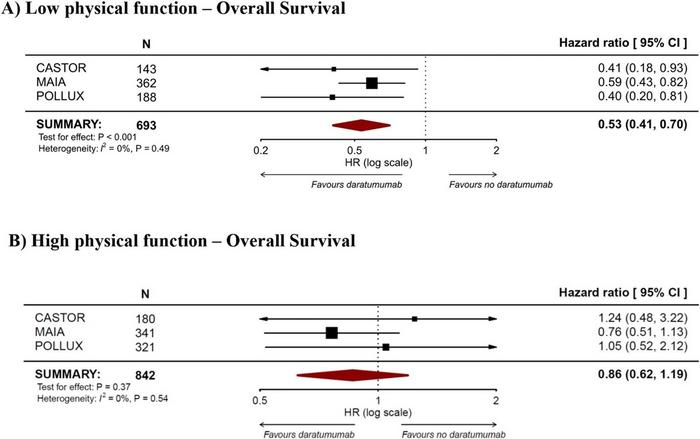A groundbreaking study published in the European Journal of Haematology is reshaping how oncologists evaluate and predict outcomes for multiple myeloma patients undergoing treatment with daratumumab, a monoclonal antibody therapy. By focusing on patient-reported physical function before initiating therapy, researchers have shown that subjective assessments provided by patients themselves serve as powerful prognostic and predictive tools, far surpassing traditional clinician-rated performance statuses. This insight promises to revolutionize personalized treatment strategies in multiple myeloma, optimizing both survival rates and quality of life.
The investigation pooled data from three major randomized controlled clinical trials—MAIA, POLLUX, and CASTOR—encompassing a diverse cohort of 1,804 participants with a median age of 66. Approximately half received daratumumab-inclusive regimens, whereas the remainder were treated with therapies devoid of the monoclonal antibody. Prior to treatment initiation, all patients completed a standardized questionnaire designed to evaluate their physical functionality—essentially measuring their ability to perform everyday activities such as walking, dressing, and basic self-care.
Analyses revealed striking associations between baseline patient-reported physical function and clinical outcomes following daratumumab therapy. Remarkably, those reporting lower physical function before treatment initiation derived the most substantial survival benefit. This subgroup experienced a 47% reduction in all-cause mortality risk and a 66% lower risk of disease progression compared to similar patients who did not receive daratumumab. These hazard ratios—0.53 for death and 0.34 for progression—highlight the profound impact that daratumumab confers on patients facing pronounced physical challenges.
In contrast, patients with higher self-reported physical function exhibited a considerably attenuated benefit. For this physically robust group, daratumumab reduced the risk of death by only 14%, a difference that lacked statistical significance, though it did confer a moderate 47% reduction in cancer progression risk. This dichotomy suggests that patient-reported physical function not only forecasts survival outcomes but also predicts differential treatment efficacy, underscoring the need for nuanced therapeutic decision-making.
Interestingly, conventional clinical metrics such as the Eastern Cooperative Oncology Group Performance Status (ECOG-PS)—a physician-assessed scale ranging from fully active to deceased—did not reliably identify which patients would benefit most from daratumumab. Despite ECOG’s widespread use, the study’s lead author Dr. Ahmad Abuhelwa emphasized its limitations: “Patients deemed ‘fully active’ by ECOG often disclosed substantial physical impairments in their self-assessments.” This discrepancy highlights a critical blind spot in clinician-centered evaluation paradigms.
This pivotal study thereby champions a paradigm shift towards truly patient-centered oncology care, where subjective experiences and self-reported functional statuses inform and guide therapeutic choices. Embracing this approach not only fosters precision medicine but also aligns treatment plans with individual patients’ lived realities and capabilities, potentially enhancing adherence, outcomes, and overall well-being.
The global burden of multiple myeloma continues to escalate, with projections indicating a staggering 71% increase in incidence and 79% rise in mortality by 2045. In the United States alone, the anticipated numbers for 2025 include over 36,000 new cases and more than 12,000 deaths. Against this backdrop, optimizing the use of life-extending treatments like daratumumab becomes paramount. This study’s demonstration that patient-reported physical function can stratify patients for maximal benefit holds immense promise to improve survival trajectories on a broad scale.
Collaboration between research institutions in the United States, Australia, and the United Arab Emirates underscores the international relevance and robustness of these findings. By pooling expertise from entities such as the H. Lee Moffitt Cancer Center, Flinders University, the University of North Carolina, and Burjeel Cancer Institute, the study harnessed a global perspective, enriching both its methodology and applicability.
Experts in the oncology community have lauded the investigation’s insights. Co-author Dr. Ashley Hopkins stressed the significance of incorporating patient voices into treatment planning, calling it “a critical reminder to clinicians to listen carefully to their patients’ functional status before starting therapy.” Similarly, co-author Prof. Humaid Al-Shamsi highlighted the move towards more compassionate, individualized cancer care, particularly for older or physically vulnerable populations.
Despite its compelling data, the study authors emphasize the necessity for further prospective research to validate these results and to evaluate whether patient-reported physical function can predict responses to other emerging multiple myeloma therapies. They advocate for widespread adoption of patient-reported outcomes in both clinical trials and standard oncology practice, which may catalyze a more responsive and adaptable treatment landscape.
In sum, this landmark research identifies patient-reported physical function at baseline as a potent biomarker that can refine prognosis and tailor daratumumab therapy for multiple myeloma. It challenges the status quo of physician-only assessments, compelling the oncological community to rethink treatment algorithms. By integrating patient insights, clinicians can better discern who will reap the greatest—or more modest—benefit, ushering in an era of more equitable, effective, and personalized cancer care.
Subject of Research: People
Article Title: Predictive and Prognostic Significance of Patient-Reported Outcomes for Survival and Adverse Events in Daratumumab-Treated Multiple Myeloma
News Publication Date: 14-Mar-2025
Web References:
http://dx.doi.org/10.1111/ejh.14410
Image Credits: European Journal of Haematology (2025)
Keywords: Clinical medicine, Oncology, Multiple Myeloma, Patient-Reported Outcomes, Daratumumab, Prognostic Biomarkers, Personalized Medicine
Tags: cancer patient care strategiescancer survival ratesclinical trial analysisdaratumumab therapyEuropean Journal of Haematologymonoclonal antibody therapymultiple myeloma treatmentpatient-reported outcomespersonalized cancer treatmentphysical function assessmentprognostic factors in oncologyquality of life in cancer





